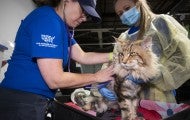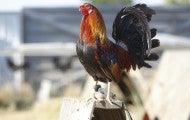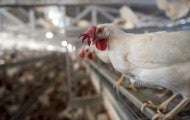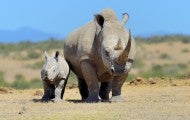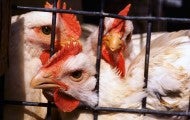The fight for public policy gains for animals at the federal level is not for the faint of heart nor the weak of spirit. Every day, in every congressional session, it’s an all-out battle to secure humane laws and regulations. Whatever we achieve, we achieve against determined opposition, including...
I appeared today on MSNBC’s Morning Joe to speak about the COVID-19 crisis and wildlife markets with Humane Society International’s Peter Li and our colleague Gene Baur of Farm Sanctuary. Together, we made the case for an immediate end to wildlife markets all over the world, and described the filth...
A poignant Washington Post story about a black bear mourning her 6-month old cub, struck dead by a vehicle in Yosemite National Park, is a reminder that even in wild spaces animals are at risk when they come into contact with humans. Since 1995, motorists have killed more than 400 bears in Yosemite...
A dead puppy in the freezer. Puppies with hacking coughs and runny noses. Sick puppies confined to isolation. Overcrowded cages. These are just a few of the shocking details our undercover investigators found at two different Petland, Inc. pet stores last fall. It’s been 10 years since the Humane...
Keeping wild animals in small, bare cages inside a retail shopping mall is absurd and abhorrently cruel. Yet this is the business model of SeaQuest, a for-profit chain of shopping mall-based wild animal petting zoos that has been plagued with controversies and cited by the U.S. Department of Agriculture more than 110 times for violations of the Animal Welfare Act.
Last fall, our Animal Rescue Team worked with authorities in Virginia to help remove 110 cats from a U.S. Department of Agriculture-licensed dog and cat dealer as part of an alleged cruelty situation. Since March 2023 alone, the USDA had documented more than 50 Animal Welfare Act violations at the facility, including serious ones such as failure to provide proper veterinary care, the housing of incompatible cats together and keeping animals in small enclosures that did not meet the minimum requirements set by the Animal Welfare Act. The breeder had been in our 2023 Horrible Hundred report (an annual list of problem breeders in the U.S.) for inadequate veterinary care and visibly ailing animals. The Virginia Attorney General’s office served a warrant, and we assisted in helping them seize the animals remaining at the breeder.
It’s official: a long-fought-for piece of legislation in Rhode Island to protect hens abused for eggs just became law. The measure phases out the extreme confinement of egg-laying hens and mandates that the birds be housed in cage-free facilities. Rhode Island joins six other states that have passed...
Vietnam’s prime minister has issued a directive that will ban most wildlife imports into the country and crack down on the illegal wildlife trade there. The directive from Prime Minister Nguyen Xuan Phuc, which will go into effect immediately, comes in response to concerns about the reported close...
The fundamental purpose of our marquee advocacy training event, Taking Action for Animals Online, occurring on September 19 and 20, is to support greater political and social engagement by those who care about animals. COVID-19 hasn’t changed a thing in that regard, and TAFA 2020 features one of the...
Brazil is one of the largest economies and the fifth most populous nation in the world. It is also one of the largest global meat producers and exporters, which has made it a particular focus for our work. Over the last several years, our Humane Society International farm animal protection division...
In light of the urgent need to address climate change and promote sustainable practices in agriculture and other sectors, there is a growing realization that our food choices matter. Some people believe that switching from beef to chicken sufficiently addresses climate concerns when it comes to diet, but when compared to non-meat sources of protein, chicken production is still the source of significantly more greenhouse gas emissions.
We’ve been working on wildlife issues since the 1960s, and we’ve been engaged in the challenges of living and interacting with urban wildlife for almost as long. John Griffin, senior director of urban wildlife programs at the Humane Society of the United States, recently co-authored an essay on urban wildlife. Here he describes the transformative potential of the work we’re doing to promote human-wildlife coexistence.
A recent story in U.S. News and World Report highlighted a simple, creative solution to prevent conflicts with wildlife: The Parks and Outdoors Department in Chattanooga, Tennessee, coated tree trunks with a mixture of sand and latex paint to deter beavers from gnawing on the trees for food and or...
The U.S. Department of Agriculture is one of the federal agencies with the most impact on animal protection issues. Who heads it can make all the difference to the wellbeing of millions of animals, including those in puppy mills, roadside zoos, factory farms, laboratories, horse show rings and in...








